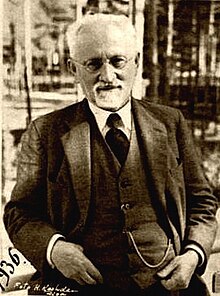Simon Dubnow
Simon Dubnow (alternatively spelled Dubnov, Russian: Семен Маркович Дубнов; September 10 1860–December 8 1941) was a Jewish historian, writer and activist.

Life
Born Shimon Meyerovich Dubnow (Шимон Меерович Дубнов) to a large poor family in the Belarusian town of Mstislavl (Mahilyow region), after receiving a traditional Jewish education in a heder and a yeshiva, he entered into a kazyonnoe yevreyskoe uchilishche (state Jewish school) where he learned the Russian language. Dubnow was unable to graduate because these institutions were soon eliminated by a Tsarist ukase (see May Laws), and he had to pursue his interests in history, philosophy, and linguistics by educating himself. He was particularly fascinated by Heinrich Graetz and the Wissenschaft des Judentums movement.
In 1880 he used forged documents to move to St Petersburg, which was officially out of reach: a rare exception to the obligation to settle in the small town in the Pale of Settlement was made only to those who were discharged from the military, 'cantonists', doctors, dentists, university graduates and the merchants belonging to the two upper guilds.
Soon Dubnow's publications appeared in the press, including the leading Russian–Jewish magazine Voskhod. In 1890, during the expulsion of Jews from the capital city, Dubnow was forced to leave. He settled in Odessa and continued to publish studies of Jewish life and history, coming to be regarded as an authority in these areas.
Dubnow actively participated in contemporary social and political life in the Russian Empire. He called for modernizing Jewish education, organizing Jewish self-defense (see Pogrom), and for equal rights, including the right to vote.
In 1906 he was allowed back to St Petersburg, where he founded and directed the Jewish Literature and Historical-Ethnographic Society and edited the Jewish Encyclopedia. In the same year, he founded the Folkspartei (Jewish People's Party), which successfully worked for the election of MPs and municipal councillors in interwar Lithuania and Poland. After 1917 Dubnow became Professor of Jewish history in Petrograd University.
In 1922 he emigrated to Kaunas (Kovno) and later to Berlin. His magnum opus was the ten volume History of the Jewish people, first published in German in 1925-1929.

In August 1933, after Adolf Hitler came to power, Dubnow moved to Riga, Latvia. Nazi troops occupied Riga in July 1941, and Dubnow, with thousands of other Jews, was transferred to the Riga ghetto. According to the few survivors, Dubnow repeated to ghetto inhabitants: "Yidn, shreibt un fershreibt" (Yiddish: "Jews, write and record").
On December 8, 1941, Simon Dubnow was among thousands of Riga ghetto Jews massacred in the Rumbula forest.
Beliefs
Dubnow was ambivalent toward Zionism, and completely rejected assimilation. He believed that the future survival of the Jews as a nation depended on their spiritual and cultural strength, and self-rule in the diaspora. This ideology became known as Jewish Autonomism, and was adopted in various versions in the platforms of some Jewish parties such as the Bund, but after the Holocaust has lost its popularity and practically disappeared from Jewish philosophy.
See also
External links
- Autonomism
- Dubnow's biography
- Simon Dubnow Institute
- Works by Simon Dubnow at Project Gutenberg
- Life and writings of Simon Dubnow book by Sophia Dubnow-Erlich (in Russian)
Bibliography
- History of the Jewish people (original in German: Weltgeschichte des Jüdischen Volkes, "История еврейского народа") in 10 volumes, 1929
- The newest history of the Jewish people, 1789–1914 (Die neueste Geschichte des Jüdischen Volkes, "Новейшая история еврейского народа"), in three volumes, updated in 1938.
- A History of Hassidism (Geschichte des Chassidismus), 1888.
- Jewish history textbook (Учебник еврейской истории) in 3 volumes, 1901
- My life ("Моя жизнь"), Berlin, 1937
